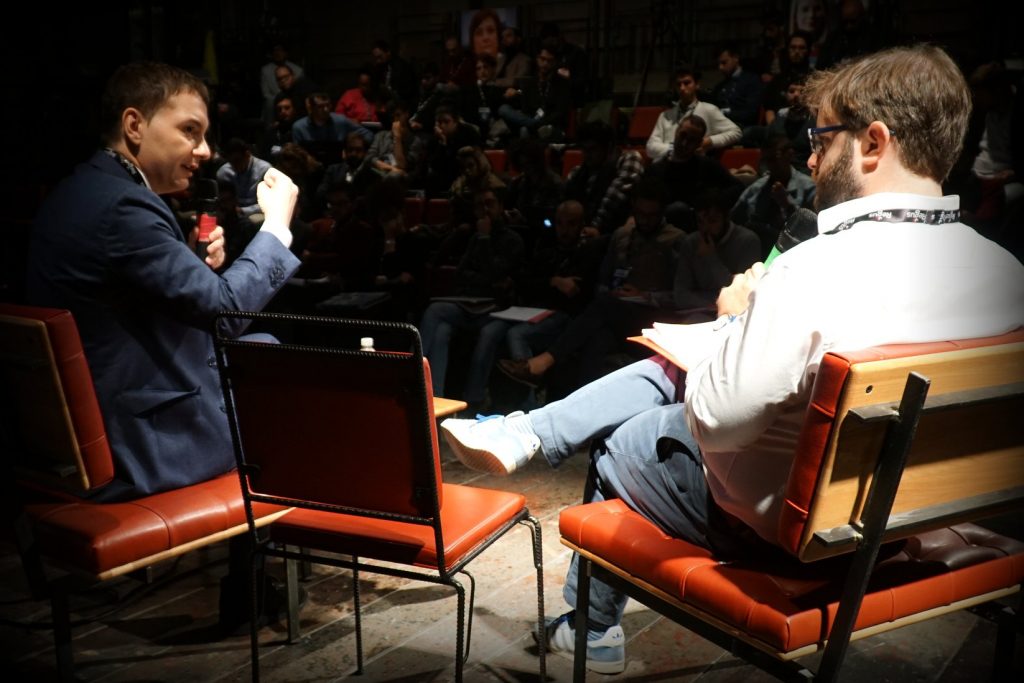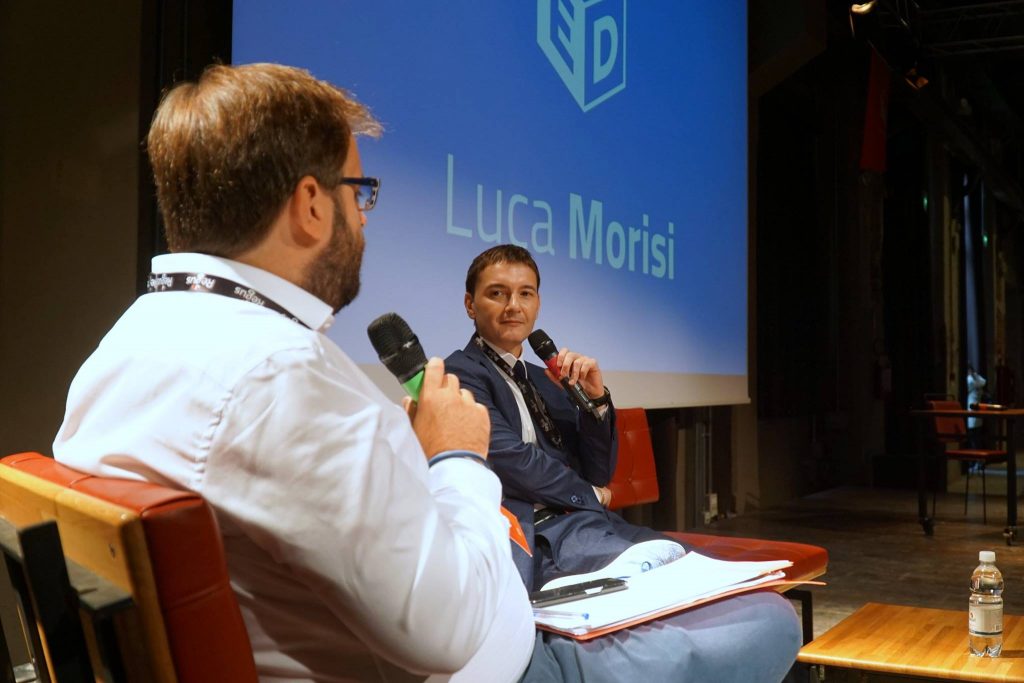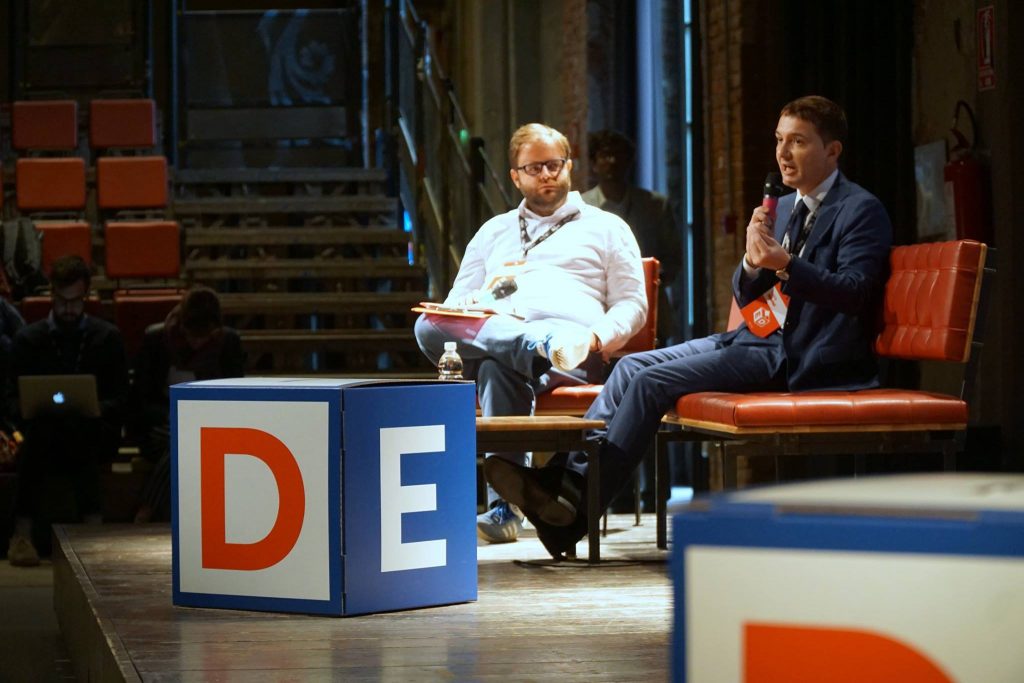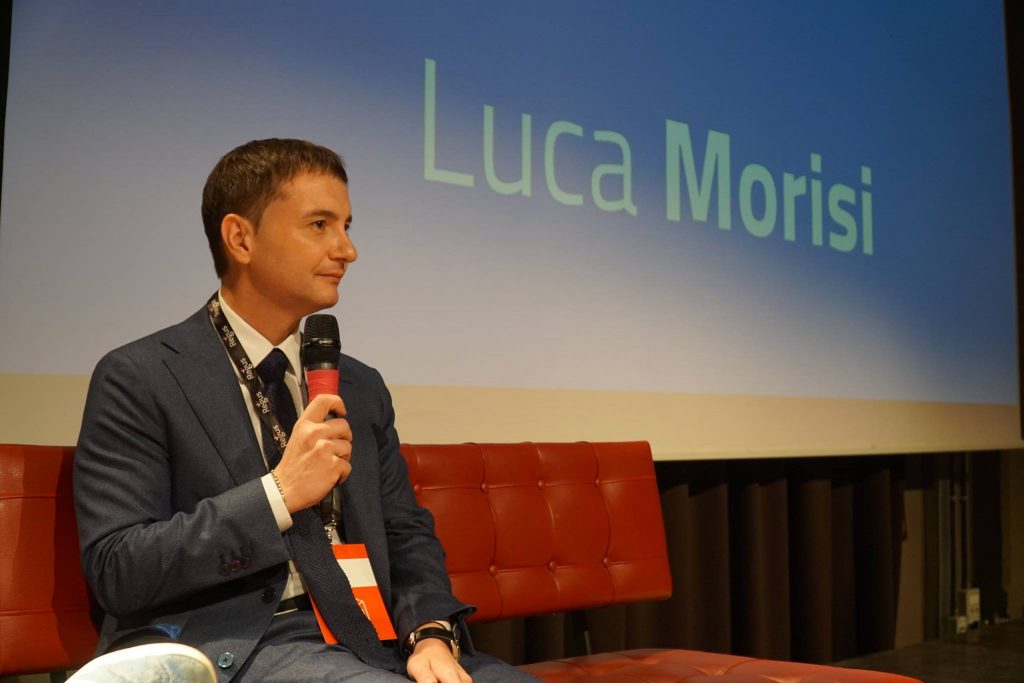🇮🇹 Italian version available here
“Don’t call me a spin doctor: Salvini’s spin doctor is Salvini himself”. Luca Morisi, head of Matteo Salvini‘s communication team, joined the 2018 edition of Election Days as a speaker. Morisi had already been guest at ED last year and two years ago. But this time around, his speech was highly anticipated: the League’s recent electoral score and – even more – the great role played by Matteo Salvini once the new government was formed, raised a lot of interest (even outside of Italy) about the “tricks” of his communication. Morisi also talked about the so-called “Beast”, a software his team has been using over the past few years to optimize tasks and activities, as Morisi demonstrated to the participants of ED. No “evil algorithm”: “The Beast is a cooperative software for the automation of activities – such as cross-posting, graph creation, event promotion, news monitoring”. Morisi also undermines his own role and that of its staff. “Salvini’s strength is that he is in charge of his communication. He is a champion of disintermediation and an absolute perfectionist. We help him, of course, but there’s only one spin doctor in Salvini’s team, and it’s Salvini himself”.

You already told us something about “the Beast”, but you said you also use web listening tools: what do they reveal to you, in order to what’s best to publish?
Can you tell us about a concrete instance? How do you understand what’s best to talk about?
I can tell you a recent one: some days ago Salvini talked about self-defense. We saw huge attention on this issue. But we didn’t see it from the “Beast”: we saw it from the fact that our live tweeting of a TV show focused on this issue reached a huge engagement. That’s how you understand if it’s something you should talk about. And that’s why a FB post by Salvini the following day was all about this, and reached almost 100k likes. But there’s no algorithm, no automation: there’s a lot of knowledge, a lot of attention and tenacity in our exploration of what people say on the web. “The Beast” doesn’t do any qualitative monitoring of comments and/or interactions. I’ll tell you more: it is offensive to suggest that there are such automations behind what we post. It offends Salvini, and our ability to do our job.
Some people have expressed critical skepticism about the way the data of the FB users that joined the “Vinci Salvini” [“Win Salvini”] game were managed. What’s your answer to this?
The users who signed in the “Vinci Salvini” game were totally aware of the fact they were giving their basic data. A registration on a FB app was required – we used 100% legal and official FB tools only, there was no homemade tool – and this app simply registered the flow of likes and comments, and associated their ID with the users’. But that was only meant to establish the name of the game winner each day, and to send emails only to those users who had chosen to give us their address beforehand. The data were not used for any kind of profiling.
Some people though linked this case to the Cambridge Analytica scandal. Both these stories are about the use of the FB user’s data for a political aim. Isn’t that true?
There’s nothing in common with the Cambridge Analytica story here. That case was about selling data gathered with a pseudo-scientific psychological test, for electoral aims. We did nothing even close to that. But we should always keep in mind that in the digital era, unfortunately, everything we do is tracked: if something is free – including social networks – it means the user himself is the product. There are always distortions and abuses, but it’s ridiculous to get upset about your privacy when you offer your personal life to the public on the SN in the first place.

Steve Bannon stated (to Reuters) that your communication along with that of the Five Star has been very innovative. But now you’re telling us that you invented nothing, except for the “Vinci Salvini” game. Who is right?
As I told to the participants at Election Days, there has been innovation: many techniques of posting, graphic composition of cards and banners, mailing list management, filling videos with info, manufacturing content… We invented a lot of stuff, in my opinion. I might be little immodest by saying it, but in many cases we have been the first in Italy. The “Vinci Salvini” game was the most important, from a merely technological point of view. But we have more in mind, things that I won’t reveal even if you torture me…
The FB live video is almost the main form of communication for Salvini and Di Maio as well. I understand why a politician or a political consultant may prefer it, as there’s no journalists to deal with. But if you step out of your role for a moment, can you tell me if you agree that this can potentially become a problem for the débat public?
So you advised Salvini to use this tool?
He needed no advice on this, it came spontaneously because he’s got a strong empathy, as everybody who meets him – even for a few seconds – can see. It’s an ideal tool for him that he embraced immediately. It’s a good way to jump over the mediation of newspapers and press offices. The news media then use those videos to provide information, they aren’t going to die because of this. They have to change to adapt of course: the digital revolution requires evolution by the information players.

Here’s some questions coming live from Twitter. Have you ever had, as Salvini and the League’s communication staff, contacts with the Russia?
Never, never, never. Here’s a funny story: there was a period when Bobo Craxi [son of Bettino Craxi, former italian PM back in the 80s] replied to anyone contesting him on Twitter with things like “Morisi is that you?”, “Morisi it’s you, I get it”, “Morisi you were in Russia, did they teach you the techniques?”… Well, of course not. Everything we built was not from Trump or from Putin. We did a lot of things before Trump did. Salvini started this very intensive, unfiltered use of the social networks back in 2012, Trump came well after then. I went to Russia a couple of times, but I know no one from Putin’s party and I have nobody there who gives me support.
During your speech at ED you said “the people are on Facebook”. Then why all this focus on Twitter?
In Italy there are 30 million people on Facebook. Compared to that, Twitter is half-empty. Even the actual number of active users is unknown: there might be 6, 7 million, maybe 8. If you use it frequently, you will realize that it’s always the same people talking about politics. Moreover, they have nicknames, and insult users who show their real face and name. Sometimes people tell us that our public is made of scum: fascist, racist people… But on the other side of the political spectrum people are no different. If you look at the tweets people write me, it’s an endless series of insults. Our success on Twitter is due to the fact that a small universe like that is easy to climb: if you have a small group of devoted people, retweeting a certain hashtag, if your communication is intense, you can climb the italian trends very quickly.

Some people say that you make use of bots…
Are you still using this tool?
No, we don’t use it anymore. Since January, or February, I believe. It no longer exists.
So the campaigns of the past months are ‘organic’?
Absolutely. I’m thinking of suing some people because of the things I happen to read. I have never – never – created or managed fake profiles on Twitter or Facebook to increase engagement artificially , the number of retweets or the popularity of the hashtags. We have never used these tactics. The only one we used, which I mentioned few minutes ago, was based on a voluntary acceptance from the users (I think no more than 200 people). And we used that rarely and we don’t even use it anymore. Plus, it was no secret , as it was easily visible through the Twitter logs. But today there’s such a strong group, even on Twitter, that we wouldn’t even need it again. Today we have people subscribing on Twitter only to support Salvini, partially thanks to our subscription campaigns. There are real people that subscribe only because they love Salvini and want to support him.
What’s your position about hate speech to minorities, or immigrants? I quote a tweet from Sofia Ventura who asks you to explain “how to push the hate of minorities in order to make it an instrument of power”. Many people care about this issue. Do you think there’s a risk of lighting a fire?
We basically describe reality. If you go outside through the neighborhood you will realize how many worrying elements there are. In the era of social networks, thousands of people were offered the opportunity to become “authors”. Before that, people talked about these things at home, with their friends, at the bar. Now the informal – sometimes uninformed, excessive – chats have risen to a public dimension. Sofia Ventura looks at immigration and does so from a left-wing perspective, but this is also about the things people say about Salvini, who is suffering a real hate campaign: people who call him “murderer”, who want to “hang” him, Asia Argento tweeting “Salvini s**t”. This is the information universe we have to operate in. Politicians must play a role in curbing unacceptable behaviours. But it’s a matter of fact that people today feel legitimated to say unacceptable things. Before social networks, only a small fraction of people was able to comment the news in public: today, it takes just a minute to open an account and say the most stupid things.

Ok, we agree on the fact that there’s hate everywhere, even outside social networks. But don’t you think that Salvini, with his communication style, makes things worse?
Don’t you think that the switch from an “analog” to a “digital” paradigm in public communication needs to be handled with care?
There’s a dialogue by Plato – I believe it was the Phaedrus – where the switch from the oral era to the written document era is stigmatised, because – they say in this dialogue – when you remove words from the mouth and put them on a “dead” document, where the author is no longer present (with his gestures, the sound of his voice, etc) you turn those words into something “dangerous” as they are separated from the speaker’s will. Therefore, every time the technological paradigm changes and this has an impact on information, the paradigm changes on many other levels as well: the interaction between myself and others, gnoseology, ontology, ethics. This is the paradigm we have to deal with today, and each of us has to deal with the existing audience.
I have to move an objection. Today you are not only the political consultant and the social strategist of the League, you are a consultant to the Ministry of the Interior and the vice Prime Minister. Don’t you think that this brings more responsibility to you and your team than before? Is it acceptable for the Minister of the Interior to speak in public wearing a Police shirt? To spread and comment on news stories in a certain way might be acceptable for a political leader, but what about a Minister of the Interior?
As I said before, Salvini is the only author of his communication. The way he decides to communicate in his new role of Minister of the Interior and vice PM is totally his choice. I’m not saying this to dissociate myself, to be clear. He is doing exactly what he did before, it’s his way of communicating. Some people like it, others don’t. I don’t believe there are rules on how one interprets a role – and by the way rules are not written in stone, they can be changed. Salvini became Minister of the Interior thanks to his political strength and the people’s support. Many, even inside the League, used to see Salvini as a parvenu: when he became the party’s leader some said “Yeah let’s put him there, he’s good at communicating, the serious job will be on us”. And then he showed his ability in the long period, not only with here-and-now communication.

Once you are in office in the Government you can’t live of mere communication, do you agree?
Can you explain more in detail how the FB group “Salvini leader” works?
The FB group was chosen because it allows a different kind of management from the FB page. In the group, the position of the posts depends on their engagement level, rather than on chronology. This group is moderated with very tight filters, but allows us to create an incredibly strong community spirit, different from a page. When we announce an event or initiative, through the group we can mobilize up to 65 thousands people, with very high engagement levels. If we ask the group to go and write on a certain page or to change their profile pic, these people just do it. And it’s something self-feeding, and needs no bot or automation. These are real people, they didn’t just appear: they form a fan club that we have been feeding for years.
You said that Salvini just describes reality, but the contents posted by him about negative news related to immigrants are way more than those related to Italians. Did you ever consider that there might be some responsibility in feeding stereotypes?
Ok but feeding a stereotype can strengthen the stereotype itself, hurting those who are victims of it, don’t you think?
Yes but this is true for everything. Confirmation bias regards all fields. My political positions aren’t particularly radical – in fact, those who know me well also know that my positions are more liberal than those of the League. The “here-and-now” communication we see on the social networks today, unfortunately, gives new strength to stereotypes: everything is over-simplified, and factions rise everywhere. Not only on immigration: vaccines, abortion, euthanasia, are all divisive issues where factions and stereotypes become stronger thanks to social network dynamics.
(Photos: Alberto Cabodi)
The interview with Luca Morisi is the first of a series from Lorenzo Pregliasco and Giovanni Diamanti to some of the main experts of political and electoral communication. In the next issue: Filippo Sensi


Commenta